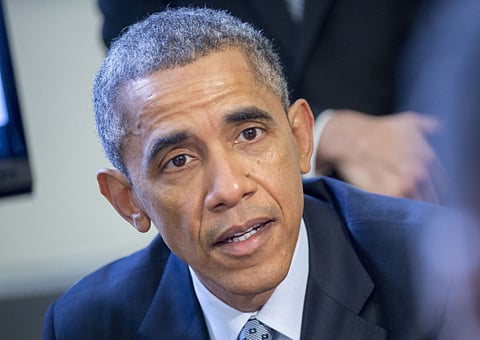Obama, hostage rescues and terrorism
Obama has proven himself to be a careful thinker when it comes to strategy

Two American hostage rescue missions in Yemen in the last few weeks: One only a moderate success, the other by almost any measure a failure. What do they tell us about both the Obama administration and the region?
First, they serve as a reminder that for all the media and government attention paid to Daesh (Islamic State of Iraq and the Levant) over the last six months, Al Qaida remains a potent organisation. In the years since the 9/11 attacks, it has changed in significant ways, losing much of its centralised structure, but the organisation and its various offshoots (of which AQAP, or Al Qaida in the Arabian Peninsula, is one of the better organised and more lethal) have not gone away.
In the wake of last Saturday’s second raid in Yemen, which resulted in the deaths of both the American hostage who the US Navy was trying to rescue and of a South African held with him, a lot of commentators in the US media have remarked that hostage-taking seems to be a “new” tactic for Al Qaida — something that the group has possibly copied from Daesh. This ignores the fact that both the hostages in question had been held for significant periods of time (the American for more than a year) and that Al Qaida’s better-known factions have little history of hostage-taking.
The raids were also a reminder of a truism often overlooked in Washington. The Obama administration does not follow its predecessor’s style of bluster and brag, and is not led by people who lionise special forces the way George W. Bush’s first defence secretary, Donald Rumsfeld, once did. Yet, it has proven to be more willing to use those forces in high-risk, high-profile operations than Bush ever was. These two raids in Yemen are cut from the same cloth as the 2011 raid that killed Osama Bin Laden or the 2009 operation to rescue an American container ship captain captured by Somali pirates.
I am not saying that the Bush administration refused to use special forces in high-risk operations, but it is difficult to think of any instance when it did so in a situation where the result, for good or ill, was certain to become public knowledge and the chances of failure were fairly high. As Michael Tomasky recently pointed out in the New York Review of Books, the success of the Bin Laden raid was only possible because of the presence of two back-up helicopters added to the plan at the last minute at Obama’s suggestion. “And yet,” he wrote, “Americans still don’t know about Obama and the helicopters. Something tells me that if George W. Bush had approved this raid and suggested the back-up helicopters that saved it, we would have known about it instantly.”
It is a fascinating observation both because it is surely true (there is no way the Bush PR team would have let a detail like that slide down the memory hole) and because it flies in the face of the narrative of this presidency that Obama’s Republican opponents have successfully crafted over the last six years: One in which a retreat from American power has been paralleled by the rise of a world that is allegedly far more dangerous for Americans. It is worth asking, however, how much of that is reality and how much is mere political spin.
Whatever his other failings, over the last six years, Obama has proven himself to be a careful thinker when it comes to strategic affairs. He avoids plunging into fast-moving situations without trying to think through the consequences (yes, including the political consequences — he is, after all, a politician) and the alternate scenarios that, in turn, arise. This does not mean he gets everything right (case in point — his now-famous “red line” comments about the Syrian government and chemical weapons) or that the decisions he reaches are not highly debatable (consider Afghanistan), but compared to the Bush administration, which prided itself on acting from gut instinct, Obama’s approach has a lot to recommend it.
The problem with politics is its tendency to define success in maximalist terms. If containing Al Qaida, or Daesh, is unacceptable because only obliterating either group will do then Obama, his critics and the rest of the world are all doomed to failure. Nuance is supposedly one of the things statesmen take pride in mastering. Not that one would know that from the way both politics and policy are discussed in today’s Washington.
Gordon Robison, a longtime Middle East journalist and US political analyst, teaches political science at the University of Vermont.
Sign up for the Daily Briefing
Get the latest news and updates straight to your inbox


